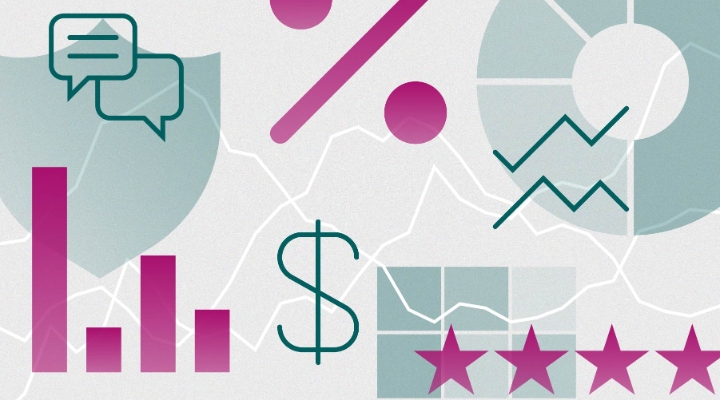
When it comes to cash, fund managers can’t really win. Holding a decent buffer tends to be a sensible strategy in turbulent years like 2022, protecting the fund from the worst of equity falls, and investors applaud their conservative approach.
But keeping too much cash to one side can backfire when markets rally, as they did in 2020 after a massive slump. Knowing when markets will turn is notoriously hard, and when they do the manager’s gamble on too much/too little/just enough cash tends to be exposed. As we enter a tough economic period, what’s the sensible approach for managers?
Fund managers are increasing their allocation to cash. According to Bank of America, which conducts a monthly global fund manager survey, portfolios now have the highest cash holdings since 2001.
On average, the survey found cash levels were at 6.3%, up from 6.1% in September and significantly above the 4.8% long-term average. There are multiple reasons for this – from avoiding losses, to avoiding risk, and to prepare for future rebounds.
Cashing In
Among the UK-domiciled funds rated by Morningstar, 26 have a net cash holding above 5%, and two are above 10%. TM Fulcrum Divers Core Absolute Return’s portfolio is currently 16.92% cash. This is up from between 1-3% the months before, but the fund’s cash allocation has ranged between 13-17% for the past year, as shown below.
Absolute returns don't promise to beat inflation, but aim for a market-beating return in all conditions. This fund therefore holds all the conventional asset classes, including cash, directly or through derivatives.
BNY Mellon’s Real Return and Global Absolute Return funds have cash holdings at 10.35% and 9.60% respectively. Invesco Balanced Risk, the third allocation fund on the list, also has a similar allocation (9.32%).
We do have to look to the fifth largest cash holder to find an equity fund.
Stewart Investors' Indian Subcontinent Sustainability fund has been slowly selling off a few stocks and has therefore increased its cash allocation over the past months, although it is not quite to the level seen at the height of the pandemic.
Currently, 9.14% of its portfolio is cash, compared to 13% in March 2020 (it has largely hovered around 5% over the past three years). The fund recently reduced its exposure to its second biggest holding, CG Power & Industrial Solutions (CGVD), as well as Elgi Equipments (ELGIEQUIP) and Tube Investments of India (TIINDIA). That said, it has also bought shares in Housing Development Finance Corp (HDFC).
Finding Suitable Investments
There's more to fund management than buying low and selling high. As important is assessing how much risk to take on in the market conditions that prevail at the time.
In the current climate, fund managers seem to have decided to reduce holdings in favour of cash – a move that will also allow them the liquidity to act on opportunities when they believe the market is ready to rebound.
One company currently holding a lot of cash is Warren Buffett’s Berkshire Hathaway (BRK.A). According to Morningstar’s estimates in August this year, the company has about $70.2 billion in reserves. With a lower risk profile, Morningstar’s sector strategist Greggory Warren has faith in the stock.
He notes that, for much of the past decade, Berkshire has struggled to find suitable investments to keep its cash balances from earning a meagre return in a historically low-interest-rate environment. But after a dip in June this year, the share price has been increasing over the past month.
"We expect Berkshire to see a meaningful improvement in its income yield this year and next, with the company's cash balances (which are mainly invested in US Treasuries) yielding more as interest rates have risen, with the benchmark federal-funds rate currently targeted at 3.75%-4.00% (levels not seen since before the 2008-09 financial crisis)," Warren says.
From TINA to PATTY
And after what can only be described as a sad year for equities, it’s understandable investors are looking elsewhere to get better returns, and with bonds offering weak returns as well, could cash be the hedge and alternative to the "There is no Alternative to Stocks" (TINA) approach we are looking for?
According to Duncan MacInnes, who manages Ruffer Investment Company (RICA), the current environment is a "very poor time to take risk". At the moment, his team is avoiding downside threats. But, in a blog, he says TINA has been replaced by PATTY: "an alternative exists, you just need to Pay Attention To The Yield. The yield on the risk-free asset – cash."
"But before we all go and fire our asset managers, there is a twist," he says.
"One of the biggest advantages of cash is that it gives you optionality, the option to move quickly and pounce on opportunities. Cash is a call option with no expiration date on every asset in the world. The expected return on cash isn’t the yield it gives you, it’s the return you will earn by being able to buy distressed or dislocated assets.
"For example, during the record-breaking volatility we saw in gilt markets a few weeks ago, it paid to be active when others weren’t."
MacInnes also notes the ability to deploy cash opportunistically means funds won’t have to nurse losses, and are able, as the market maker, to improve chances of getting a good deal. Plus, holding cash is an acknowledgement that opportunities may be better in the future.
"When attractive situations appear, you can allocate in size. As Warren Buffett said, 'when it’s raining gold, reach for a bucket, not a thimble'."









.jpg)


















